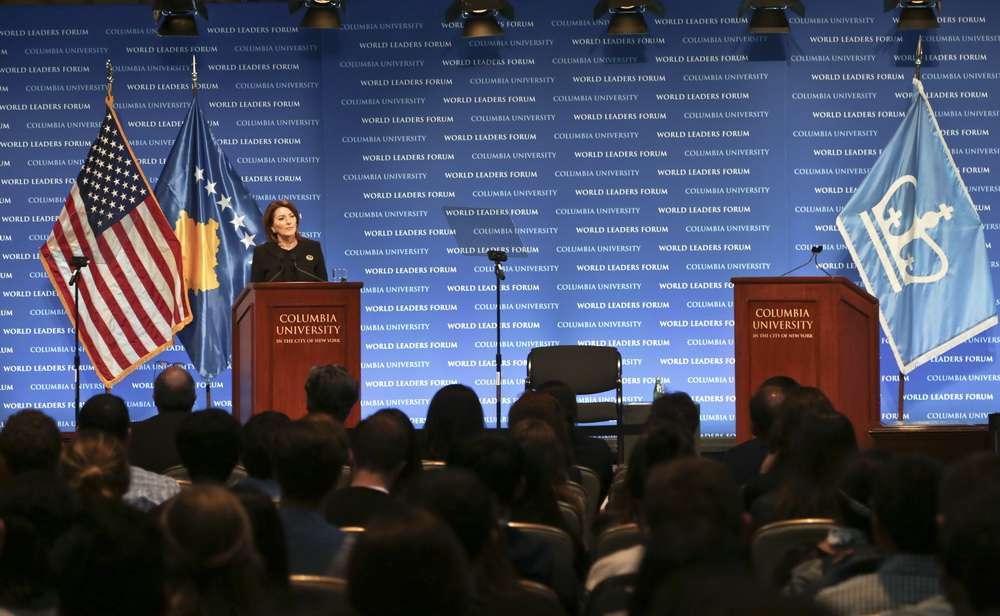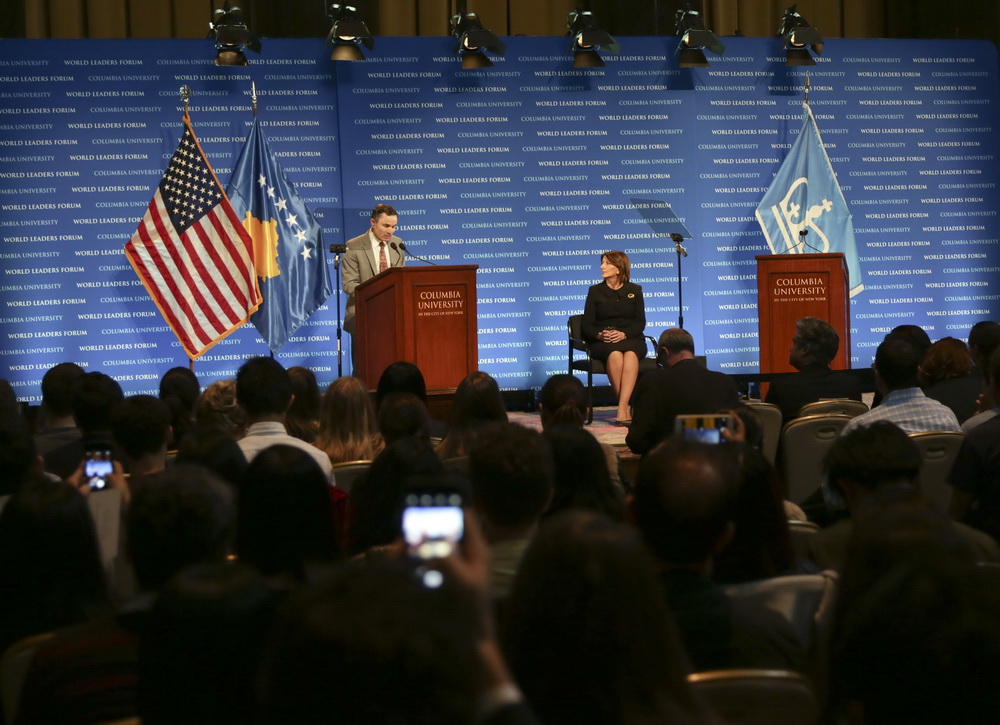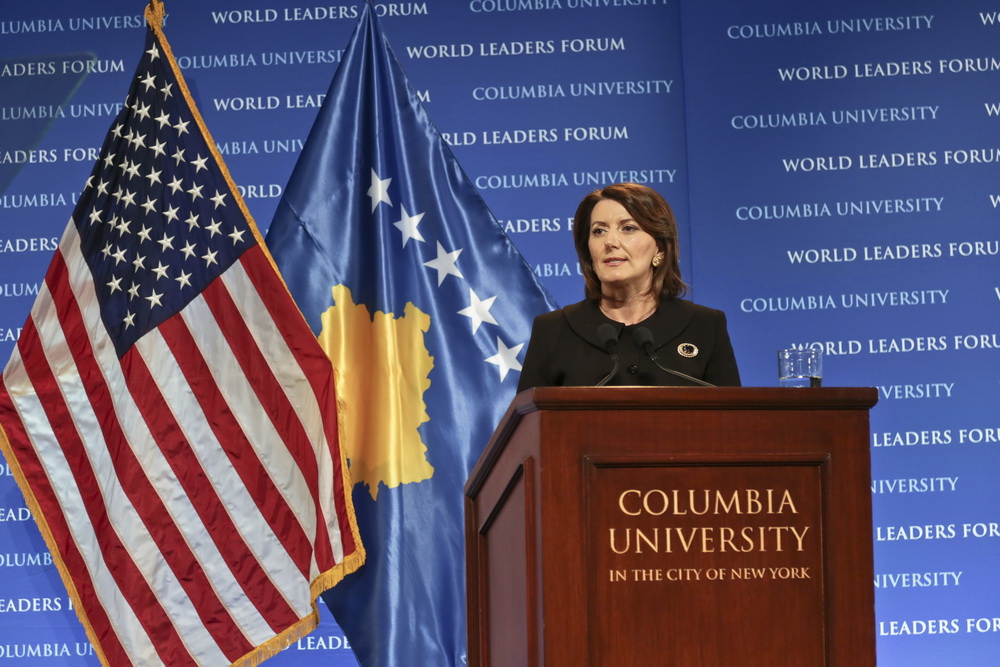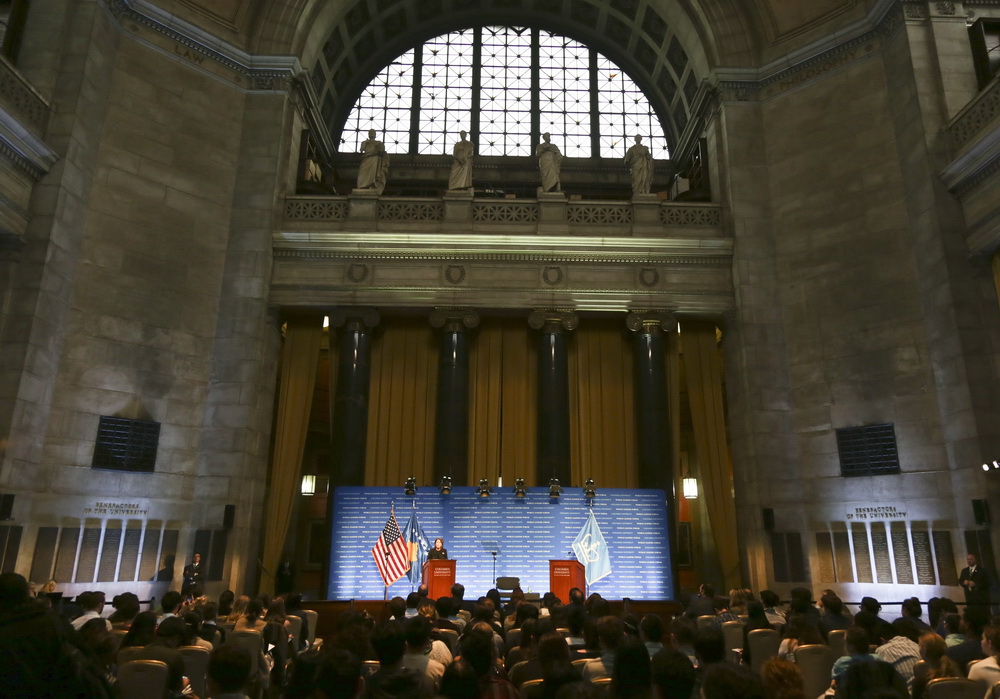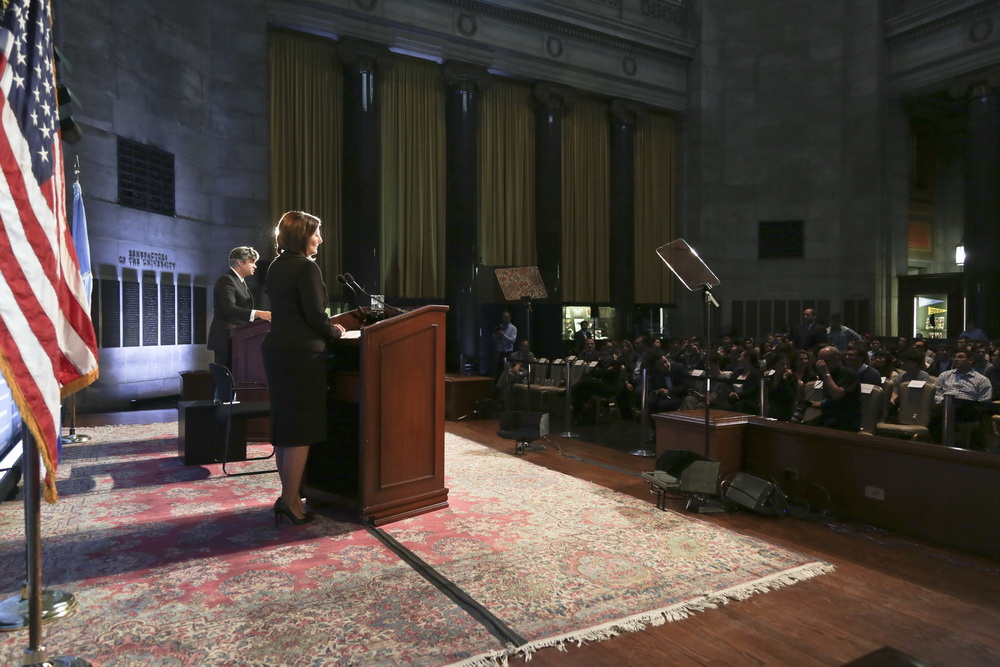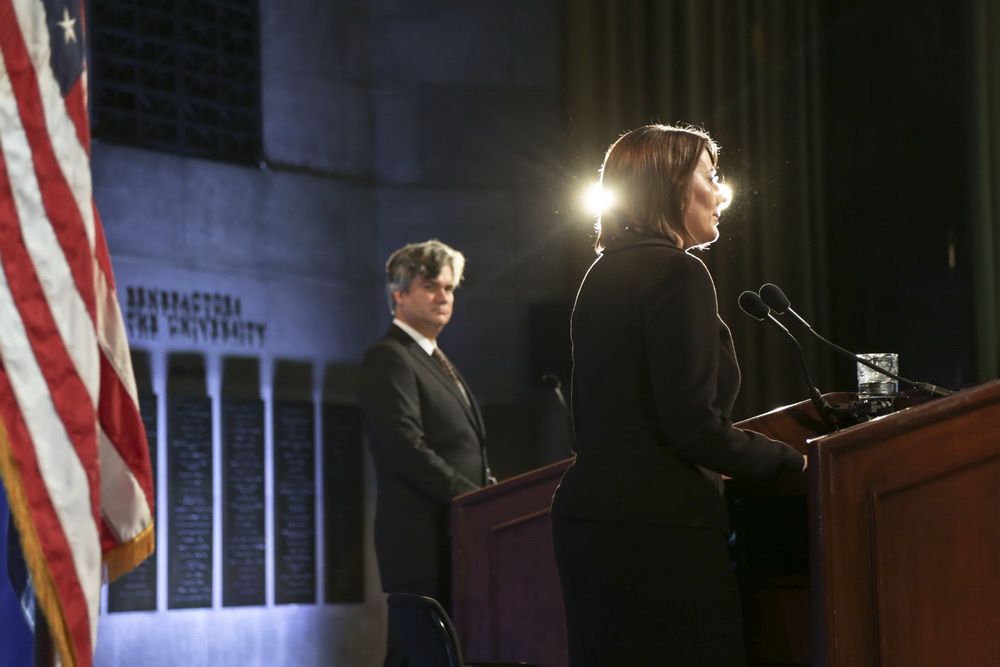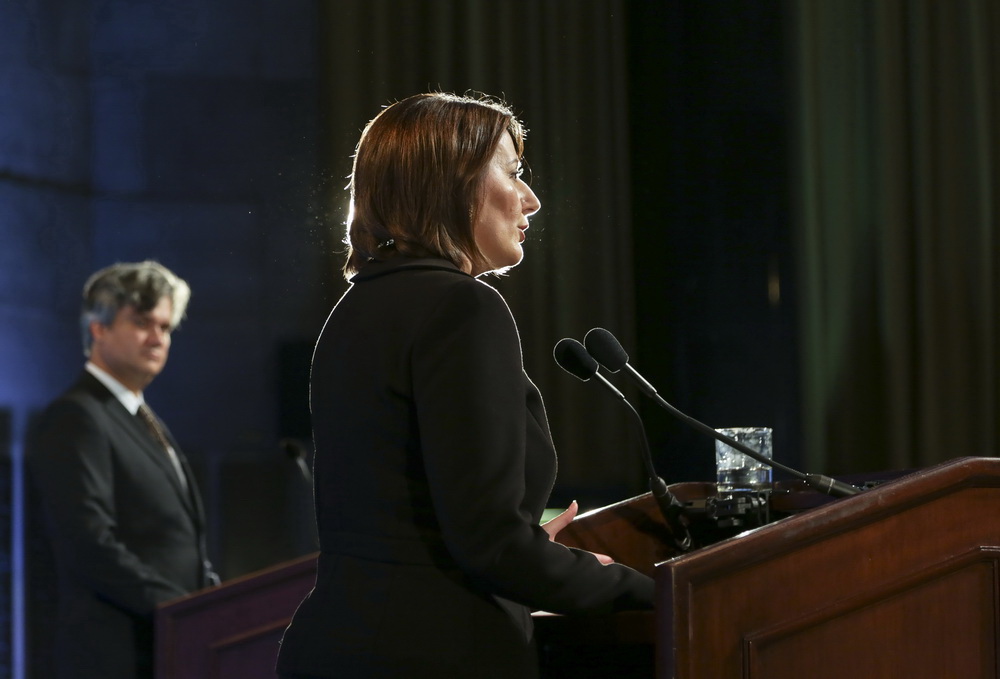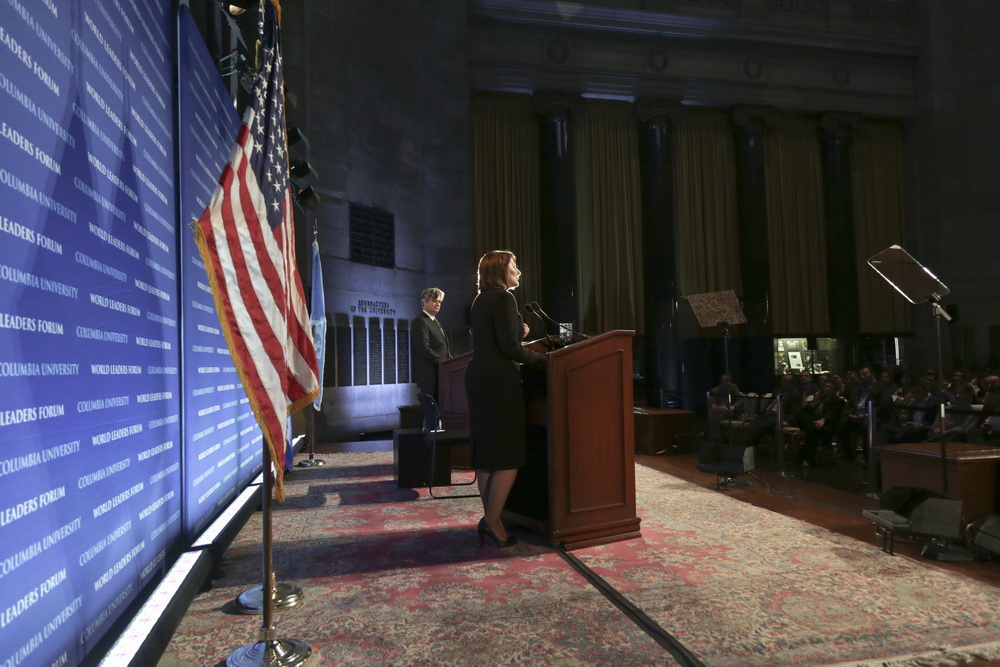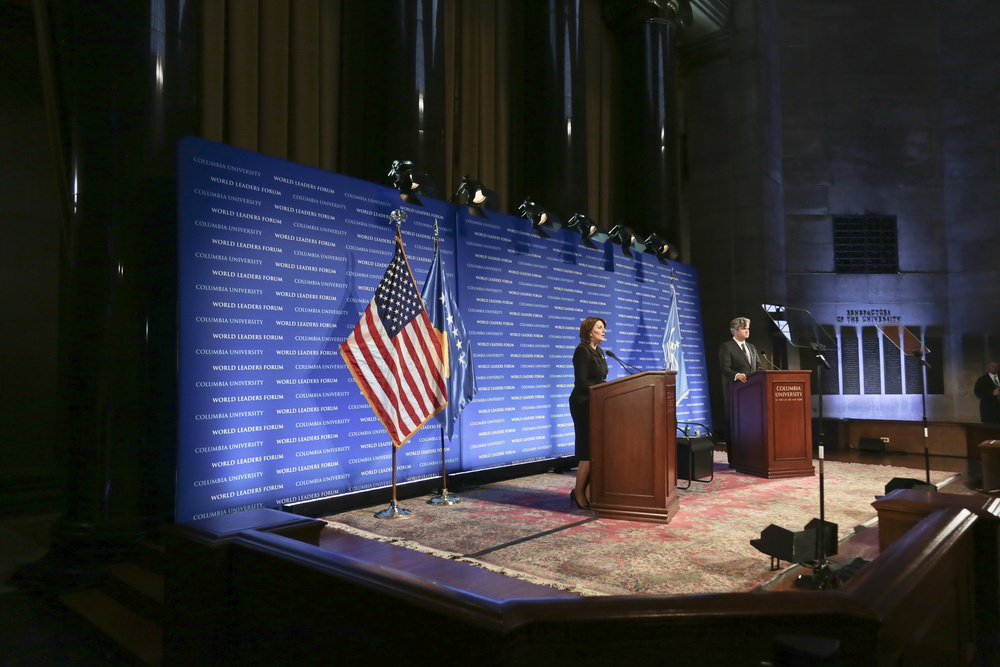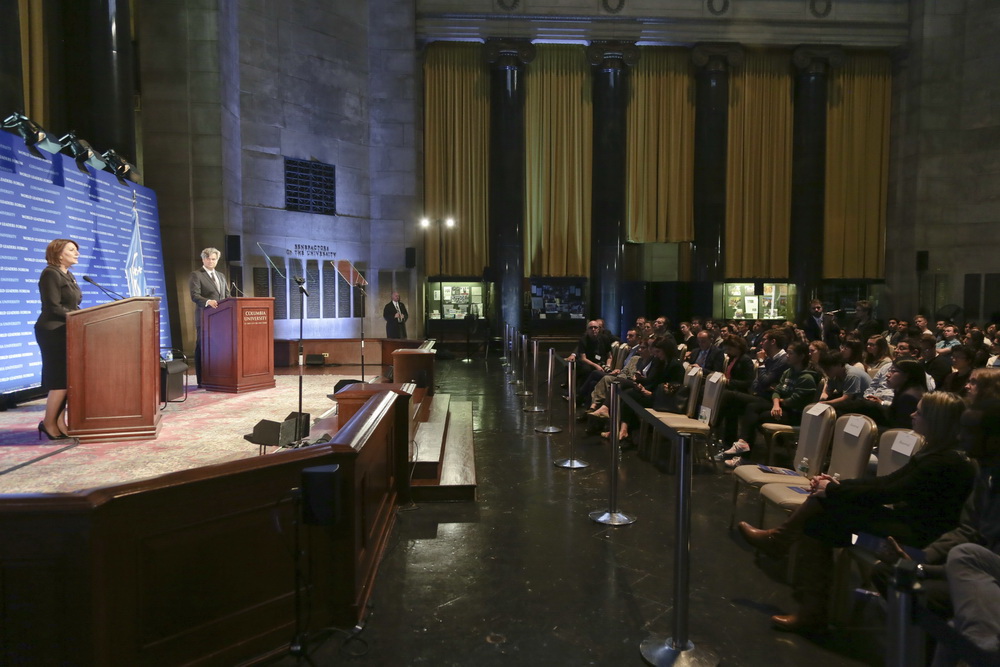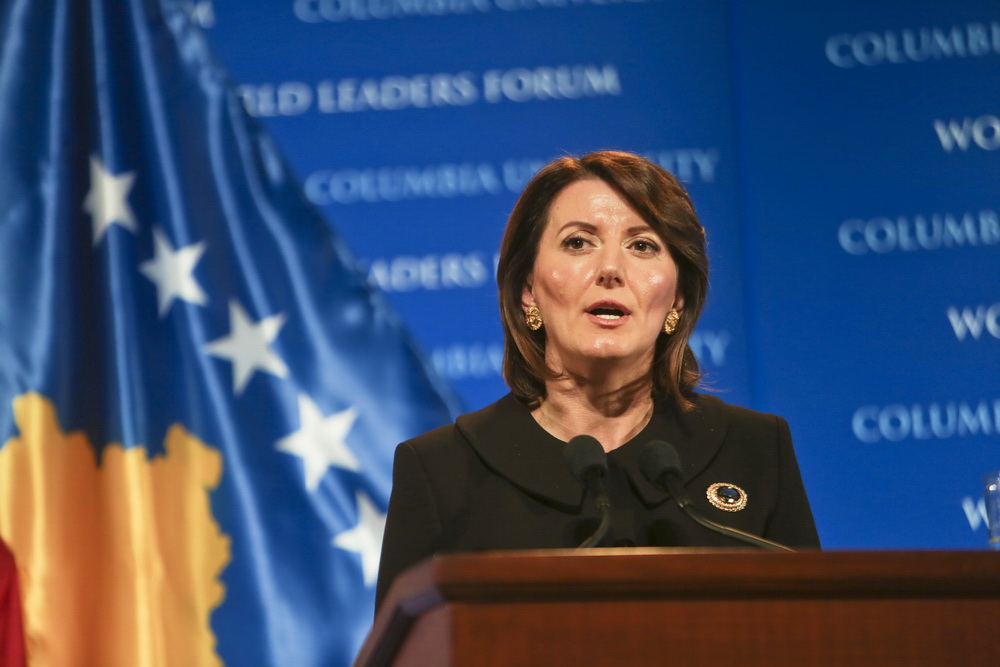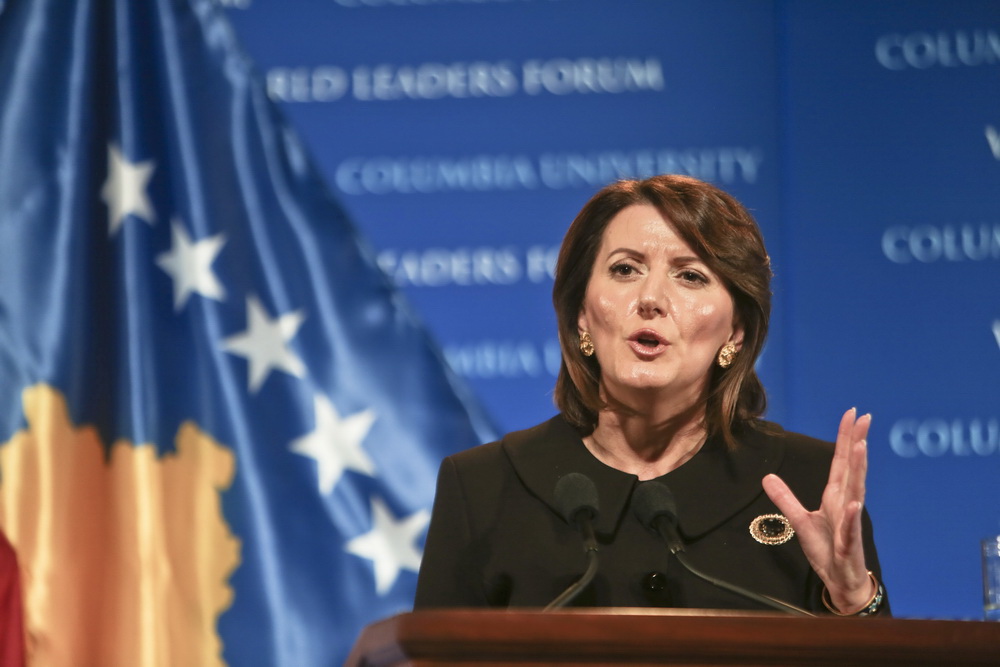I am honored to return to Columbia University, to the World Leaders Forum series, to speak about the struggles of building a sustainable peace but to also remind you of the enthusiasm, the strength and hope that carry us through in these times of transition.
KOSOVO: A COUNTRY IN TRANSITION
Dear Mr. Dean,
Distinguished guests,
Ladies and Gentlemen,
I am honored to return to Columbia University, to the World Leaders Forum series, to speak about the struggles of building a sustainable peace but to also remind you of the enthusiasm, the strength and hope that carry us through in these times of transition.
I, too, like most of my fellow citizens, have lived through the repression and war. I lost friends and loved ones to a terrible conflict.
And I often wonder what inspires whole societies to move forward. How do they find the strength, the resilience?
For many today in the audience the Kosovo’s war of 1998 and NATO’s humanitarian intervention that stopped Serbia’s genocide against Kosovo Albanians in 1999 is a distant past.
Yet, this past is not that distant even for you. What the people of Kosovo and the international community have done and are still doing is relevant ever here and today for the future of intervention and state-building.
It offers important lessons of how to move post-conflict forward, which is what I want to talk to you about today.
Twenty years ago we could not work, we could not go to school, and we could not walk in the streets, without being harassed by Serbian police.
We were very poor, we could not vote, we were vulnerable to rape and killing. Literally, we could not live.
Today we are still a poor country, struggling like other developing countries, but we are alive and free.
We have turned ourselves around from a people that did not dare to dream to a nation with many dreams.
As we quickly understood after the war in Kosovo, when the conflict ends, survival is not the only worry.
There is so much loss to mourn. There are many – too many – graves to dig. The worst is that there are so many missing even today, the people who disappeared, for whom we cannot dig any grave.
And then there are homes to rebuild, there are the challenges of getting electricity and running water restored.
A whole school system to get back on track. A depleted economy to revive. , There are relationships to be restored, tensions to be managed, power to be negotiated.
There are too many competing priorities. In fact, there is so much to do and everything becomes a priority.
We have come far from the emergency.
Kosovo is no longer a war-torn place. And since 2008 is an independent state, Europe’s youngest state.
In the past seven years,, we have strengthened our sovereignty. Our democratic institutions are representative of the Parliamentary democracy that we have built.
We have learned that democracy is complex. That building an inclusive society will always be an ambition, a work in progress.
We can and should always do better. We are learning again how to live together and to find strength in our ethnical and religious diversity.
We still struggle to create an open economy, with fair competition and free of corruption.
Some have become jaded as we are still short of fulfilling the promises of prosperity, of social and economic mobility.
We want Kosovo’s younger generation to stay in Kosovo and build their country, not to leave in search for opportunities abroad.
These are some of the visible, immediate consequences of the war and reconstruction. But then, there is more than meets the eye.
Not so long ago, in the beginning of my tenure as the President of Kosovo, I was invited to speak at a conference on the empowerment of women.
With a woman as the President for the first time in the history of the modern Balkans, Kosovo had attracted much attention. Within Kosovo and abroad this was seen as a chance for women for more inclusion in decision-making.
At the conference, we talked about the big picture,. We spent much time talking about equality in the workplace, equal opportunities and property rights for women.
We worried whether the thirty percent quota for women in Kosovo’s institutions would be fair.
Whether such measures would ever be self-sustained.
Whether there was a reason to believe, and the experiences to assure us, that the quota would be effective and not only for women.
We felt engaged – a part of the important global debate on gender inequality.
We felt that our debate was so timely, advanced, in par with the current global trends.
We felt that although we had just come out of a war, our issues were no different from those of other countries.
But what a handful of women sitting quietly in a corner of that conference room showed to me that day would changed me, and how I thought about these issues, forever.
They were survivors of sexual violence, some of the estimated thousands of women who still bear the scars, the physical and psychological scars of this form of torture – rape as a tool of war.
One of them told me she was raped in front of her family as Serb forces came to kick them out as part of their ethnic cleansing campaign.
Another spoke of groups of women held captive and raped for weeks. This was the first time they shared their stories with anyone outside of a tight circle of survivors.
As a Kosovo Albanian and later as a police officer, who helped build the Kosovo Police force, I knew of these horrific crimes committed against women in Kosovo.
I had read of a mother who could not bear to tell anyone that her daughter was raped long after she was found drowned in the family well.
With a systematic campaign of rape unleashed during Kosovo’s war, the Serbian security forces intended to continue the war long after it ended.
To leave behind a society scared, scarred, ashamed, and deeply broken.
A society unable to speak about what happened to its women,
I also knew of the tireless efforts of women activists who had dedicated their lives to helping survivors of rape however they chose to deal with their trauma.
These activists were the pillars on which the survivors of sexual violence leaned for over a decade.
The rest of the society was too busy rebuilding houses, and building the heroic narratives that normally follow a liberation war, to pay attention to survivors of rape.
In the chaotic aftermath of the war, and in the absence of justice for survivors, most of them opted for complete silence.
Some who decided to come forward to their family members were abandoned by them due to the stigma that rape carries in Kosovo, though Kosovo is not unique in this.
International prosecutors have documented the war crimes and crimes against humanities committed by Serbian forces in Kosovo. They have tried the perpetrators.
But there has been no trial for perpetrators of rape, not at the Hague, not in Kosovo, even though Kosovo was administered by the United Nations.
Survivors rarely came forward to speak of the horror exercised on them.
And Kosovo’s society would just not talk about it, in part because for many years we did not know how to handle it.
When courts, local and international, failed to secure justice for fifteen years, I made the pledge that the country we created, for which they had suffered so much, would no longer fail them.
Appalled by the economic hardship, social exclusion and further victimization of survivors of rape, in 2012, I decided to commit to their cause.
I started to campaign on their behalf, I supported their legal status as civilian victims of war.
Our peace would not feel complete without them finding peace.
I built on the knowledge and expertise of the different women’s networks that have helped the survivors of wartime rape.
And last year I created the National Council on the Survivors of Sexual Violence in War, taking the issue to the country’s top office and putting it on the top of my agenda.
The Council gathers different entities, from Ministries and Parliamentary committees to women’s NGOs, to comprehensively deal with the relevant legislative and policy issues
So far, we have managed to enact a law that offers them reparations, one of the few laws of this type in the world
We have created secondary legislation to improve the status of survivors.
We have led awareness raising campaigns.
We have fund-raised for different employment opportunities.
Above all, we have given voice to survivors and we have restored their dignity.
And this year, on Kosovo’s liberation day, June 12, the art installation Thinking of You became our society’s rallying call to support survivors.
At the initiative of the Kosovo-born artist Alketa Xhafa and New York producer Anna Di Lellio and with the backing of my office, five thousands skirts were displayed in the football stadium of Pristina in honor of the thousands of survivors of wartime rape.
Those skirts came from the people of Kosovo. For a month, women and men throughout the country donated skirts in solidarity with the survivors.
Many people, including survivors, shared dresses they wore on special occasions.
A skirt worn at a brother’s wedding.
A dress a Member of Parliament wore the day she signed the independence declaration.
There were also dresses of sad occasions: a gown of a marriage that fell apart because of the rape.
They were hung on the capital’s football stadium to show the magnitude of this form of torture and to recognize that the shame did not fall upon the victims but the perpetrators of this horrendous crime.
They also symbolically blurred the line. Rape could have happened to any of us during the war.
Former fighters, singers, members of the parliament, ministers and thousands of ordinary people joined to symbolically tell them that they were not alone.
That they would be embraced and no longer abandoned.
Ladies and Gentlemen:
There is so much hope for societies that embraces everyone. And without embracing women, especially those who are most forgotten, no society has embraced everyone.
We still have to build the kind of country we promised our predecessors we would build, when as refugees we hastily returned home.
And like in every beginning, there are setbacks. Transitions are long.
But there is also so much hope — hope to change, hope to engage and make an impact, hope to become better.
It is this hope that has helped Kosovo keep moving forward.
Thank you!

